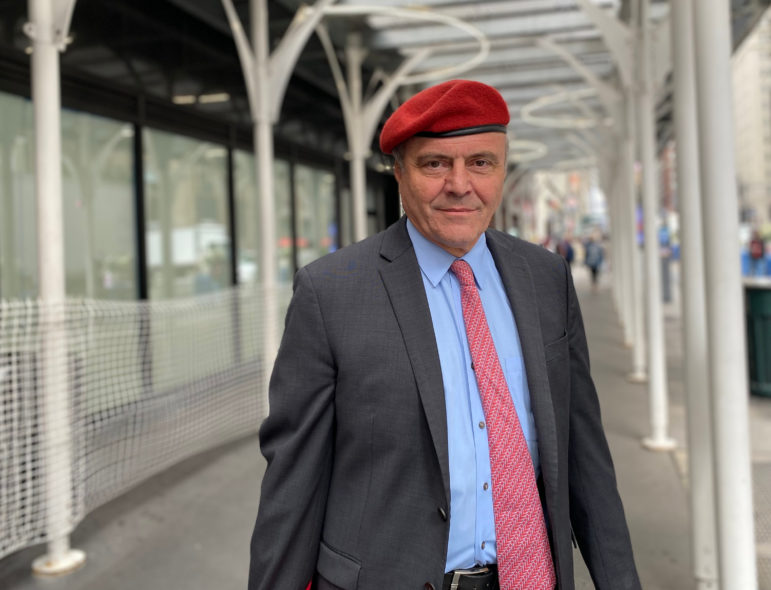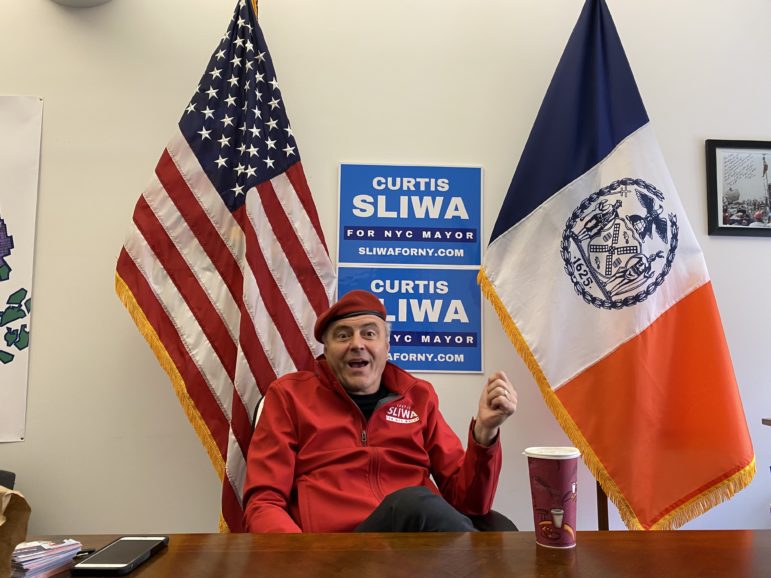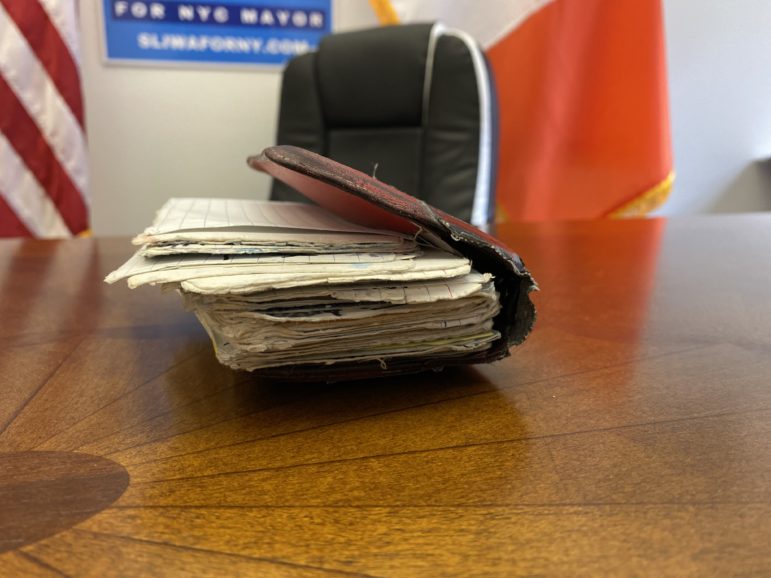“We had gone from being a very functional city, even with de Blasio and all his inabilities, to just crashing and burning,” the Republican candidate told City Limits during a recent interview inside his spartan, cat-free Midtown headquarters.

David Brand
Republican candidate Curtis Sliwa, photographed outside his Manhattan office.Curtis Sliwa, like most in the business of self promotion, is a talker. Wind him up and listen to him charm or rant, or do both.
The 67-year-old local celebrity has managed to grab headlines and attract TV cameras since he was a teenager sorting recyclables on his Canarsie lawn. That was before he donned a red beret and formed his Guardian Angels subway patrols. Before he began a successful career in talk radio provocation. And long before he began collecting cats inside a cramped Upper West Side apartment ahead of a run for mayor—a platform that has allowed him to reach residents beyond his Staten Island, Middle Village and Nassau County core audience.
But exactly 20 years before next week’s Election Day, the future Republican candidate for New York City mayor sat in silence, watching the action unfold before him while jotting down his thoughts on a small pad.
It was Game 5 of the 2001 World Series, a matchup between the Yankees and the Arizona Diamondbacks that ended early in the morning of Nov. 2. This stands out to me because I was sitting a couple seats away. My dad had won tickets to the game by phoning into the Curtis & Kuby Show on WABC during his morning commute and besting a handful of other callers in a singing contest. He belted the best rendition of “New York, New York” from his Honda Accord, and we were World Series bound. When we got to our upper deck seats, we were surprised to find Sliwa, his ex-radio partner Ron Kuby and their wives sitting next to us.
The Yankees won that night after third baseman Scott Brosius hit a game-tying homer in the ninth and Alfonso Soriano singled in the winning run three innings later. But the club went on to lose the series in seven games. Sliwa was quiet throughout the night, even as fans nearby heckled his radio sidekick: “Hey Kuby, what’s the matter?” one man yelled as the liberal defense attorney seemed to take a wrong turn on his way to the concourse. “You can find a crooked cop, but you can’t find your way to the bathroom?”
Over the past two decades, there have been plenty of ups and downs for Sliwa’s favorite ball club, his finances, his romantic relationships and his partnership with Kuby. The same could be said for New York City, which in the same span of years has experienced the aftermath of the Sept. 11 terror attack, a major recession, a Queens man in the White House, a left-wing political resurgence, the COVID-19 pandemic and a reckoning with racist injustice in between.
How does the GOP nominee see his hometown, the place he wants to lead even if he tends to portray it as a crime-ridden hellscape? Are we better off now than before?
Sliwa doesn’t think so. “We had gone from being a very functional city, even with de Blasio and all his inabilities, to just crashing and burning,” Sliwa said during a recent interview inside his spartan, cat-free Midtown headquarters. He’s up on the seventh floor of a 7th Avenue office building, down the street from a shop adorned with weed leaves, or, “Maui Wowee Hindu Kush” in Sliwaese.
“We were lacking. And then the pandemic came and the lockdown came and it just completely came undone,” Sliwa said.
“But I’m not like the others who are saying this is like the 70s and 80s. It’s not,” he continued. “There were 2,000 murders a year on average; 500 shootings, most unsolved; abandoned buildings; gangs. We’re not at that point, but the decline is very noticeable, especially the quality of life.”
Those themes have dominated the 2021 race for mayor, culminating in a match up between Democratic nominee Eric Adams and Sliwa. The final days of the Democratic primary were marked by dark depictions of violent streets—fueled by an actual uptick in shootings and murders as well as smear campaigns against policies intended to curb police abuses and the application of bail on poor people of color.
Two days before the interview, Sliwa made news when he rushed to a crime scene near his Upper West Side apartment and announced that, despite a swarm of cops, he was the one who found a gun used in a shooting. He later backed off the claim and apologized for a tweet—sent out by his campaign without his permission, he said—bragging that he has taken more weapons off the street than Adams, an ex-cop. The staging reminded many New Yorkers of Sliwa’s admission that his Guardian Angels concocted a kidnapping and other escapades to attract attention.

David Brand
Sliwa in his campaign headquarters in a 7th Avenue office building.
Nevertheless, Sliwa made hay out of the supposed gun score in interviews on conservative talk radio the next morning. “Our neighborhood [the Upper West Side] has become a shootout at the A-OK Corral,” he said on the Bernie & Sid Show on WABC. It doesn’t matter that the numbers don’t quite bear that out (There have been zero murders in the 82nd Precinct, where Sliwa said he found the gun, and two shootings so far this year—down from one murder and two shootings last year, NYPD data shows). The messaging in those law-and-order riffs is clear: New York is on the brink of Fear City.
But Sliwa can, in fact, discuss the Big Apple with optimism. His kids are living in nice homes with their mothers, he said. He looks forward to riding the subway and enjoys meeting new people every day.
“The city revives me because I look out and see all the things I could do to make this city better. I’ve never had this desire to leave New York City,” he said, echoing a slogan— “Improve. Don’t Move”—that appears on signs decorating his campaign office.
Sliwa’s own ideas for improving the city: He wants to build supportive housing in old office buildings. He wants to capitalize on cryptocurrency (though he himself isn’t holding any coin: “I can’t afford cryptocurrency. Look at where I live. I own nothing,” he said. “But I do realize it’s coming.”) And he wants to force private universities and hospitals exempt from local property taxes to start paying up.
Sliwa also wants more cops on the streets and a renewed emphasis on broken windows policing. “I think zero tolerance is going away, quality of life initiatives are going away, broken windows is going away,” he said. But he denounces a hallmark of that era, the stop and frisk policy that resulted in the profiling, harassment and alienation of hundreds of thousands of Black and Latino boys and men.
READ MORE: In Advocating ‘Precision Policing,’ Eric Adams Embraces a Term Police Critics Have Targeted
Other ideas seem to contradict the “Improve. Don’t Move” concept. Sliwa says he wants to send homeless New Yorkers to rural areas outside of New York City and recreate a “Camp LaGuardia”-type program for families living in shelters. Children experiencing homelessness and other low-income kids would benefit from opportunities to live far outside the city, he said.
“I think in many instances we’ve gotta get people out of the inner city because of the temptations,” he said. Wealthy people can choose to leave, he argues. “ Poor and impoverished people have no options. Where are they going to send their children?”
Two days earlier, the New York Times Magazine published a feature on the experience of a young homeless woman from Brooklyn who had attended a Pennsylvania school that seemed to mirror Sliwa’s vision. The young woman, Dasani, was first profiled eight years ago, her life illustrating the “Tale of Two Cities” concept that candidate Bill de Blasio campaigned on. The article by journalist Andrea Elliot, based on a forthcoming book, depicted the challenge of navigating new, strikingly different terrain while separated from loved ones back home—suggesting that an abrupt move may not be the panacea for addressing homelessness and related issues that Sliwa, and many others, think it is.
Sliwa said he had not read the article, and disputed a suggestion that shipping poor people out of the city seems to contradict his campaign slogan.
“When wealthy people have problems with their kids, what do they do, they get them out of here, let them go bucking broncos in Montana, a Swiss chalet in Switzerland, because you understand you gotta get them out of that environment,” he said. “Donald Trump? Sent to New York Military Academy. John Gotti Jr., sent to New York Military Academy. Why? Because their fathers had no control of their sons.”
Those examples were notable coming from Sliwa. He hates both men.
About 15 years ago, Gotti Jr. stood trial for allegedly trying to murder him. He was acquitted. Trump, the ex-president impeached for inciting a deadly far right insurrection and the soul of the modern Republican Party, has never earned Sliwa’s support. The GOP candidate for mayor still considers himself a Never Trumper.
That stance has threatened to turn off members of New York City’s weak Republican Party. But Sliwa says he doesn’t care. “I’ve been an independent all my life,” he said. “I’ve shared some Democratic values. I’ve shared some Republican values.”
And he would have remained chair of the Reform Party if “Andrew ‘Evil Eyes’ Cuomo, with his desire for vengeance” against the Working Families Party, had not orchestrated a rule change forcing third parties to reach a higher vote threshold every two years to secure a ballot line in future elections.
“I was happy to be chairman of the New York State Reform Party because I was dealing with Democrats and Republicans and mostly Independents and we weren’t controlled by either major party,” Sliwa said.
After about an hour into his discussion with City Limits, the candidate excused himself and went downstairs to tape a brief interview about the Rikers Island crisis with PIX11. When he returned to the office, he said he only had a few minutes before a function in Brooklyn, followed by an event in The Bronx and then back to Manhattan for a fundraiser. He says he sleeps three hours a night (Adams’ campaign has made similar claims about the Brooklyn Borough President’s scant shuteye schedule).
As he removed his red jacket and began to knot a tie, the interview turned to COVID vaccines. Sliwa opposes mandates and has attended anti-vaxxer rallies across the city.
Still, he himself got fully vaccinated about five months ago. He rose from his chair to retrieve his vaccine card from his wallet—a Costanzian brick held together with black duct tape and stuffed with notes and phone numbers. “This is my hard drive,” Sliwa said, placing the leatherbound compendium on his desk. “This is my whole life.”

David Brand
Sliwa’s wallet, stuffed with notes and phone numbers written in black or blue Sharpie.
He agreed to have the thing photographed and chuckled as he opened it to a page full of phone numbers, each written in black or blue Sharpie. The page, it turned out, was a fitting cross section of the people Sliwa tends to engage with during his decades in the public eye—and who he will need to turn out in historic numbers to have a slight chance of winning the mayoralty.
There was Trump fixer Roger Stone’s number in blue ink, just above conservative talk radio host Mark Simone. The page featured three numbers for Frank Morano, another AM radio commentator whose 2019 wedding got a lengthy write-up in the Staten Island Advance. Sliwa was there and so was Gotti Jr. “Needless to say they kept John and Curtis on opposite sides of the room,” the Advance wrote of the nuptials.
The opposite page of Sliwa’s opened address book had the contact info for a News 12 Brooklyn reporter, a phone number for the owner of Staten Island’s oldest bar and an unlabeled number, accompanied by reminder: Tuesday 4 pm.
City Limits called all of those contacts (except the reporters) to find out what they think of the GOP candidate who hates the GOP standard bearer.
“Even if Curtis is a never Trumper, I think he’d do a good job on NYC’s #1 issue… Crime,” Stone wrote in a text after his phone went straight to voicemail. “I also have a lot of respect for Eric Adams, although I’m sure, just as with Curtis, we disagree on many things.”
But Stone stopped responding when asked if he would vote for Sliwa if he could.
Lenaye Leidy, a Republican and the co-owner of Staten Island’s oldest bar, Leidy’s Shore Inn, said she has always been a fan of Sliwa, despite his Trump opposition. “I’m not going to hold that against him,” she said. “I think he’s a good, decent man and true to his word.”
“Right now we need to get Curtis in there, and if Trump people can open up their minds a little bit and be a little more flexible and say look no one’s perfect, not even Trump, we can,” she added. “It’s funny that he’s anti-Trump because I think he’s got a part of him that’s very much like Trump—very true to his word.”
And Al Gattullo, a radio host and former Sliwa sidekick, had a simple message to skeptics: “Don’t underestimate him,” Gatullo said.
But in a city where registered Democrats outnumber Republicans by about seven-to-one, a Sliwa defeat to Adams seems all but certain. A PIX11 poll published Monday had Adams beating Sliwa by 40 percentage points. Sliwa has urged his supporters not to be discouraged. “Don’t let polls suppress the vote!” he tweeted Monday.
As he prepared to leave his interview with City Limits, the conversation returned to the Yankees and baseball. Just outside Sliwa’s office hangs a signed portrait of Yankees legend Joe DiMaggio—a nine-time World Series champion, a mid-Century icon and a metaphor, Paul Simon sang, of a bygone era that conservative voters tend to revere.
But Sliwa, a former centerfielder and third baseman at Brooklyn Prep, doesn’t much care for that strain of Americana.
“I hated DiMaggio,” he said. “I met DiMaggio when he was alive and he was a prick. My hero was Mickey Mantle. I met him when he was alive. He was a prick. Willie Mays who lived in Riverdale … he was a prick.”
“Here were the three greatest athletes and they’re angry,” he continued, while he walked out of the office and into the elevator. “They’re miserable. They don’t want to sign anything.”
A few moments later, the doors to the elevator opened and Sliwa walked through the building lobby. When he exited onto the sidewalk, he posed for photos before shaking hands with the first passerby he saw as he crossed the street.










5 thoughts on “If New York City Is So Bad, Why Does Curtis Sliwa Stay?”
Adams told a black woman not to call the police about fireworks an she took his advice an got shot eight times an died he was against the anti crime unit an now wants it back he is a two face an I no him well what a piece of work he is
I was a longtime listener of the Curtis and Kuby show on WABC for a number of years until Kuby was mysteriously shown the exit. And I don’t recall Sliwa bad mouthing Trump while he was president for anything during that time. it was Kuby who was the on-air anti-Trumper. But Mr. Red Beret had endorsed Marco Rubio for 2016 president. He wasn’t alone though, many popular rightwing talk show hosts pimped GOP candidates other than Trump.
Sliwa will likely become the loser in the race but it’d be nice, as a bipartisanship thingy, to offer him a deputy mayor job.
Your unfair click-bait headline (If New York City Is So Bad, Why Does Curtis Sliwa Stay) is something more appropriate to the rag that calls itself the New York Post. It reminded me of the love it or leave it taunts of my youth. As a life long (and long-lived ) Democrat & New Yorker, I would not vote for Sliwa because I simply don’t believe he is competant enough to be a Mayor of NYC. But then again, without equating the two Mayoral contenders ( and hopefully assuming that Mr. Adams heart is basically in the right place), I still have doubts about Eric Adam’s depth of competence as well. I wrote in Maya Wiley for Mayor– and hope that we can reverse the five-card monte gimmick of rank choice voting that prevented us from having a legitmate debate and a true contest between Adams and his closest leading contender after the initial primary vote –as in all NYC prior election run-offs.
That certainly was a great game – loved sitting right next to Kuby….a real friendly guy who took all the insults in stride. Oh, by the way – excellent article, especially the George Costanza reference!!!
Curtis Sliwa would of made a great 👍 mayor. He would appoint a lot of honest and knowledgeable people in his administration!